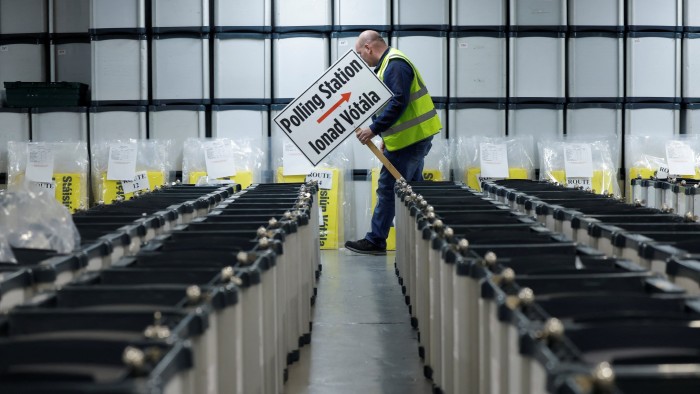Ireland votes in a general election on Friday, with parties dangling promises of lavish spending and tax cuts funded by the country’s big budget surpluses. But Donald Trump risks turning off those gushing fiscal taps.
Trump’s sweetener of a 6 percentage point cut in corporation tax for companies making products in America, matching Ireland’s 15 per cent, is a danger for a country that has grown rich from big American companies with European headquarters or large plants there.
“There’s [a] very, very good reason to be worried about corporation tax receipts stalling or reversing,” said Barra Roantree, assistant professor in economics at Trinity College Dublin.
Polls predict a tight election, which Paschal Donohoe, outgoing public expenditure minister and president of the powerful EU club of Eurozone finance ministers, said this week “economically matters like no other in my lifetime”.
The conservative Fine Gael party, led by Prime Minister Simon Harris, its centrist coalition partner Fianna Fáil and Sinn Féin, the main leftist opposition party, are virtually neck and neck.
All have outlined multibillion-euro spending programmes and tax cuts, made possible by the €30bn corporation tax haul and €24bn budget surplus expected this year.
But just three US companies account for about 43 per cent of all corporation tax receipts, according to the Irish Fiscal Advisory Council, a watchdog, which has never named them. The Currency, an online media site, has said the three are believed to be Microsoft, Apple and Pfizer.
“Over 80 per cent of our corporation tax receipts and over 50 per cent of our payroll tax receipts are generated by US multinationals,” said Brendan Murphy, head of tax for Baker Tilly Ireland. “It is important we have a government in place who will protect the exchequer.”
For decades, Ireland has focused its economic model on attracting foreign direct investment — helped by a low tax rate. It raised its 12.5 per cent rate for large companies to 15 per cent from this year, under the terms of an OECD deal aimed at getting multinationals to pay more tax.
Large drug companies often create patents in the US and generate most of their sales there, but then locate intellectual property rights, production and profits in Ireland to lower their domestic tax obligations.
Brad Setser, a senior fellow at the Council on Foreign Relations, a US-based think-tank, said: “There is revenue to be gained [for the US] . . . if they can reclaim the tax base, a lot of which is currently in Ireland.”
Setser believes US companies book profits worth about $350bn in low-tax jurisdictions. He thinks at least a third is booked in Ireland. His research has estimated the US could generate up to $30bn a year in new tax revenue from taxing these profits.

Trump is not expected to enact corporate tax changes immediately after taking office on January 20, and would probably require congressional support to lower the US corporate tax rate.
Ireland and the US have deep cultural links: up to 2mn Irish emigrated to America because of the 19th-century potato famine. Trump even owns a golf course and hotel in County Clare on the Atlantic coast that extols the “legendary Irish hospitality” on its website.
Analysts warn it would be foolhardy to rely on those ties under the president-elect’s administration.
“If Trump starts putting pressure on the pharma sector and the IT sector to start reporting profits through the States, some company is going to yield. — they aren’t going to be thinking ‘we’ve always loved Ireland, they’ve been great to us in the past’,” said Derek Mooney, a former Fianna Fáil adviser.
If that happened, “suddenly we won’t have the money to do all these big projects that we need to do — I think we’ll be in a bad place”, he said.
Ireland has set up two sovereign wealth funds to save some of its bumper revenues for leaner times — and to meet future pensions, climate and infrastructure challenges.
Despite its wealth, the country has major infrastructure bottlenecks including housing, transport and energy which the outgoing government has acknowledged are a risk to investment.

All three parties are also promising domestic tax cuts.
Fine Gael has pledged to cut the VAT rate for hospitality and retail from 13.5 per cent to 11 per cent; Sinn Féin says it will cut that rate even lower to 9 per cent.
Fianna Fáil’s tax plans include cutting the lower rate of an unpopular tax called the Universal Social Charge introduced in 2011; Sinn Féin has vowed to scrap USC altogether on the first €45,000 of income.
Among spending pledges, Fine Gael is offering €1,000 in a savings account for every new baby, while all parties have vowed to slash childcare costs.
The government has warned that half of last year’s corporation tax take was a temporary windfall.
But the country’s finances are so healthy that, even in the unlikely event that all of the windfall evaporated, it would still be able to manage.
“That would leave us with something like 3 per cent of GNI deficit next year — and that’s quite sustainable,” said Kevin Timoney, chief economist at brokerage Davy. Gross national income strips out the distorting effects of global companies on the Irish economy.
No US company has indicated it plans to leave Ireland and the American Chamber of Commerce Ireland said 48 per cent of its members expected to increase staff numbers over the next 12 months.
Even so, Ireland could still be caught in the crosshairs of a Trump trade war.
Howard Lutnick, Trump’s pick for commerce secretary, last month blasted the “nonsense that Ireland of all places runs a trade surplus at our expense”.
Irish exports to the US last year were worth €54bn, two-thirds of which were chemicals and pharmaceuticals, while imports totalled €23bn.
Trump said during his presidential campaign that he would impose a blanket tariff of between 10 and 20 per cent on all non-Chinese US imports. Chinese exporters, meanwhile, would be subjected to a 60 per cent levy.
In a signal of intent, the president-elect on Monday said he would slap tariffs of 25 per cent on Mexico and Canada, and 10 per cent on China unless these trade partners clamped down on fentanyl production and illegal immigration.
Ireland is rich now but the election falls almost 14 years to the day since its humiliating EU-IMF bailout after a rash property boom and bank collapse.
In a televised leaders’ debate on Tuesday, Sinn Féin leader Mary Lou McDonald berated both her rivals.
“You brought the crash,” she said, gesturing to Micheál Martin whose Fianna Fáil party was in power at the time. “You brought austerity,” she said, turning to Harris whose Fine Gael party took over in 2011.
The outgoing coalition, meanwhile, played up fears about changing the crew just as Ireland faced choppy economic waters.
Standing outside Microsoft’s Ireland headquarters, Donohoe said on Tuesday: “The stakes are high for the next few years and we don’t want to be rudderless and adrift . . . at a moment in which such change is brewing.”
Additional reporting by Aime Williams in Washington
Data visualisation by Martin Stabe and Clara Murray in London
Source link









